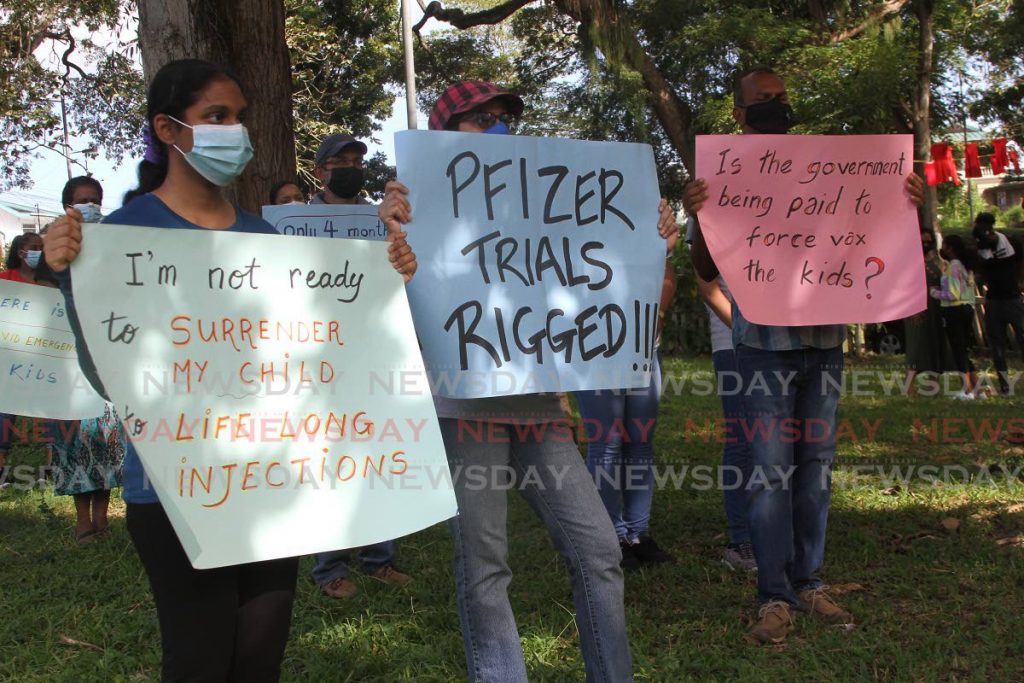Study finds Trinidad and Tobago's unvaxxed not convinced by government info

While many vaccinated people in Trinidad and Tobago said their main source of information on the covid19 vaccine was from government and official sources, unvaccinated people said this source, along with personal internet research, was most helpful in their decision not to take the vaccine.
This was just one of the findings of a study on covid19 vaccine hesitancy commissioned by UNICEF, funded by USAID and done by the Caribbean Development Research Services Inc (CADRES) in October and November 2021.
A UNICEF release said the wide-ranging study examines the extent of, and reasons for, vaccine hesitancy, and whether the minds of vaccine hesitant persons can be changed. It said the study was carried out in six countries: Barbados, Dominica, Grenada, St Lucia, St Vincent and the Grenadines and TT, with well over 5,000 people being surveyed.
The TT-specific report said 1,480 people were surveyed, evenly spread across males and females and three age ranges, with 46 per cent being parents. Most (55 per cent) were employed, had a secondary-level education (47 per cent) and 13 per cent reported being unemployed because of covid19.
TT was found to be the second least vaccine-hesitant of the six countries surveyed. Sixty-five per cent of respondents said they were vaccinated, second only to Barbados.
Respondents were asked if they would agree to have their children vaccinated against covid19. Only 34 per cent said yes at primary level and 50 per cent at secondary level. The main reason was that they felt their children were too young (12 per cent), followed by it is a choice and "I choose not to " (six per cent), and "don’t trust the government/medical authorities" (five per cent).
Vaccinated people said they were initially hesitant to take the vaccine because they didn’t trust the vaccines, thinking they were unsafe/developed too quickly/unsure what’s in it (20 per cent), were unsure about long-term effects, (17 per cent), or didn’t like the vaccine options available (eight per cent.) They said the main factors that convinced them to change their minds were speaking to their doctor (12 per cent) and doing more research (11 per cent).
Unvaccinated people said they did not take the vaccines because they thought they were unsafe/developed too quickly/unsure what’s in it (25 per cent). They also did not take the vaccine because it was a choice and they chose not to (21 per cent), or because they did not trust the government or medical authorities here (16 per cent). A majority (68 per cent) said their views on taking a vaccine did not change over time.
The report said the unvaccinated person in TT is not of any particular age or sex, has a secondary-level education and does not work in the formal sector.
Vaccinated people said their primary sources of information on the covid19 vaccination situation were government/official sources (33 per cent), personal internet research (19 per cent), and private/personal medical sources (17 per cent). Unvaccinated people preferred to get their information from local or cable TV (26 per cent), WhatsApp (22 per cent), and social networks of family and friends (14 per cent.)
The sources of information that they relied on to remain unvaccinated were personal internet research (28 per cent), and government/official sources (22 per cent), while frontline medical/elder care workers and social media tied at 16 per cent.
They said if they had more information on side effects (36 per cent), efficacy (35 per cent), and the different types of vaccines available (32 per cent), they might be swayed to take a vaccine.
Other factors that could persuade unvaccinated people to take the vaccine include getting more scientific or medical information (45 per cent), while the vaccine being necessary to secure/maintain their job or required to travel overseas tied at 35 per cent.
The report said unvaccinated respondents did not seem keen on the use of popular personalities to get the vaccination message across, as more than half found this unhelpful (51 per cent), while 54 per cent of vaccinated people found celebrity messaging helpful.
Vaccinated people believed in wide-ranging vaccine mandates, while unvaccinated people did not.
The report recommended that “communication strategies need to speak to key concerns, target the demographic profile of the unvaccinated and examine the use of non-governmental personalities and influencers. Supplemental strategies need to consider the risk to vulnerable groups and, in respect of younger and unemployed persons, consider promoting infotainment products that might reach this audience.”
Health Minister Terrence Deyalsingh said, “This report will help feed into our behaviour change management programme. Your profile of the unvaccinated in TT will certainly help us come up with a more focused policy intervention and communications strategy.”
The report can be viewed at https://www.unicef.org/easterncaribbean/reports/covid-19-vaccine-hesitancy-survey-report-2021

Comments
"Study finds Trinidad and Tobago’s unvaxxed not convinced by government info"